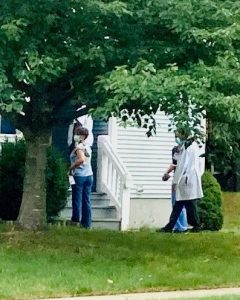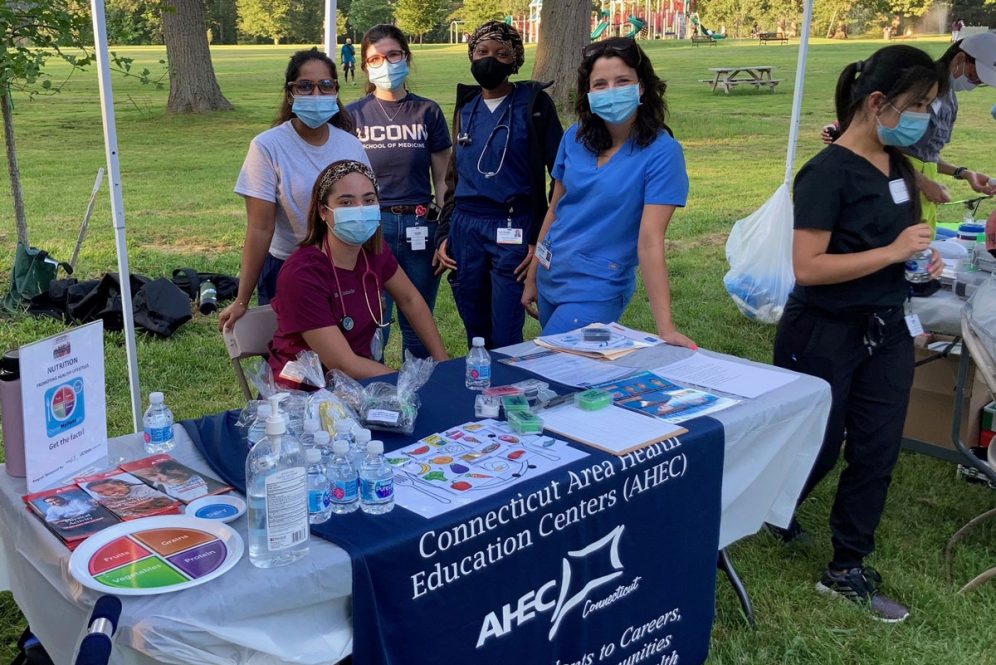More than 30 UConn School of Medicine faculty and UConn inter-professional health students engaged Hartford residents at a free health fair in Keney Park Aug. 20, in collaboration with the Urban Ecology and Wellness Center and the Keney Park Sustainability Project. There they offered health screenings for blood pressure and blood glucose, as well as COVID-19 health education and free COVID-19 prevention supplies to residents.
The next morning, 20 UConn Health physicians and students went door-to-door in medically underserved neighborhoods in Hartford’s North End to address vaccine hesitancy. Visiting some of the highest-risk, lowest-vaccinated neighborhoods, they answered questions and provided vaccines in the comfort of the residents’ own homes.
We found many cases where people didn’t have transportation, were hesitating due to bad information, or had jobs and other responsibilities that interfered with getting vaccinated. We were able to offer them shots in their arms right then and there… — Dr. Bruce Gould
Dr. Bruce E. Gould, associate dean for primary care, also is director of the Connecticut Area Health Education Center (CT AHEC) Network, and medical director for the Hartford Health Department. He and the CT AHEC Program helped recruit and coordinate volunteers and lead the service effort, which is being run again this coming weekend; additional dates are being planned through the fall.
The door-to-door vaccination campaign, Gould said, was initiated by the Hartford Department of Health and Human Services (DHHS), in collaboration with the UConn schools of Medicine, Nursing, and Pharmacy, AHEC’s Urban Service Track, and the South Park Inn Homeless Shelter student-run clinic, as well as faculty and residents from UConn’s Department of Family Medicine.

“Physicians and RNs from Connecticut Children’s, staff from Trinity Health and others also joined in,” Gould explained. “In addition to the health fair on Friday, 20 students and faculty joined Hartford’s Department of Health and Human Services workers on Saturday morning to knock on doors, provide vaccine information, and vaccinate anyone who was interested and of age.
“People were surprised to see medical professionals in white coats and scrubs walking through their neighborhood on a Saturday morning, especially hours before a hurricane was due to hit. We found many cases where people didn’t have transportation, were hesitating due to bad information, or had jobs and other responsibilities that interfered with getting vaccinated. We were able to offer them shots in their arms right then and there, direct them to other vaccination resources, and set up follow-up appointments for their second shots.”
Gould, who also serves as medical director of the Community Health Center Association of Connecticut (CHCACT), said more than 20 people were vaccinated, including one person driving by in a truck actually stopped to see what was going on and asked to be vaccinated.
“The team debrief on Saturday afternoon made it clear that this truly was a useful and successful effort, and one that should be continued and expanded as we try to get a handle on vaccine misinformation and hesitancy,” Gould said. “We learned a lot about ‘boots on the ground’ public health, and the lessons we gathered will be utilized in repeat performances over the coming months.”



